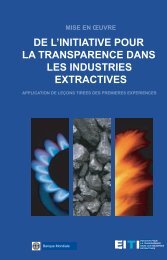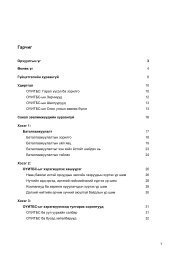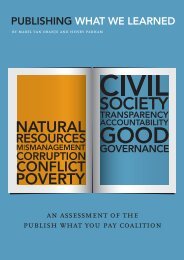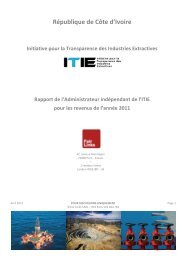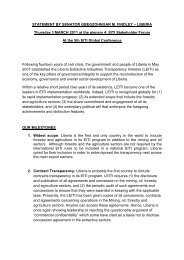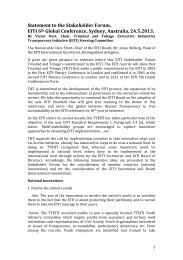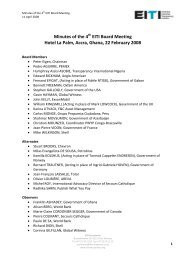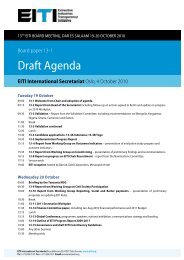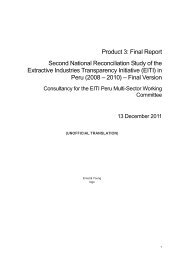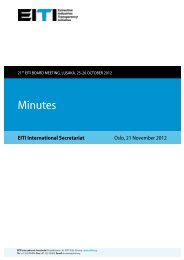EITI Business Guide
EITI Business Guide
EITI Business Guide
Create successful ePaper yourself
Turn your PDF publications into a flip-book with our unique Google optimized e-Paper software.
EsTaBLIsHMEnT oF procEssEs and sysTEMs<br />
16 <strong>EITI</strong> BusInEss GuIdE<br />
15<br />
CASE STUDY 3<br />
One company was involved in a<br />
roadshow which toured a country that<br />
had recently signed up to the <strong>EITI</strong>. The<br />
roadshow also featured representatives<br />
from government and civil society. The<br />
company manager gave presentations<br />
about how the extractive industry works,<br />
what happens to the resources extracted<br />
by the company, an explanation of what<br />
royalties are and what happens generally<br />
to the revenues generated by the<br />
company.<br />
The government has now signed up to the <strong>EITI</strong> in this country.<br />
What happens next?<br />
once the government has formally agreed to sign up – typically via a public<br />
statement from the president or another senior politician – companies can publicly<br />
declare their support for the <strong>EITI</strong> on company websites and in local media, as well<br />
as write letters of encouragement to individual ministers who may have taken a<br />
leadership role in persuading the government to support the <strong>EITI</strong>.<br />
There is likely to be a formal launch conference in order to publicise the<br />
government’s decision to adopt the initiative, and to explain what exactly the <strong>EITI</strong><br />
programme will deliver. at this conference, as well as at other relevant meetings,<br />
companies can run briefing sessions for civil society organisations, media and other<br />
local stakeholders to explain:<br />
• how extractive industry companies work on a day-to-day basis;<br />
• fiscal systems and revenue flows;<br />
• the legal and contractual obligations of companies and governments to<br />
monitor various aspects of company operations;<br />
• the different kinds of payments which companies make to government;<br />
• how those payments are assessed and collected;<br />
• how civil society groups can engage with these issues.<br />
This will help to ensure that local civil society organisations have a sufficient level<br />
of understanding about the aims of the <strong>EITI</strong>, as well as the wider nature of the<br />
extractive industry, in order to make informed decisions about how the initiative<br />
will operate in the country.<br />
The launch conference also provides an opportunity for the government to begin<br />
establishing a multi-stakeholder group (see Question 18) with representatives<br />
from government, the private sector and civil society. This group decides how the<br />
<strong>EITI</strong> will be implemented in the country via a country Workplan that outlines the<br />
roles and responsibilities of all stakeholders and includes a clear timeline (see<br />
Question 19).



